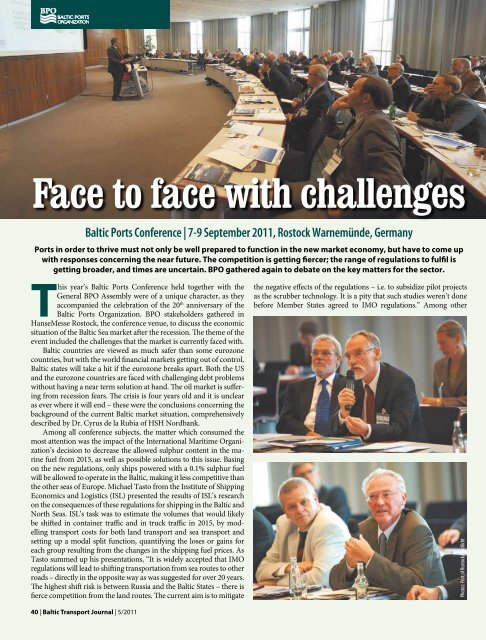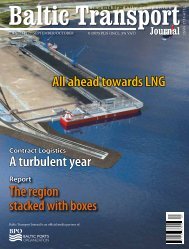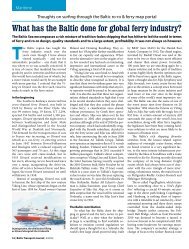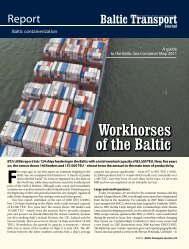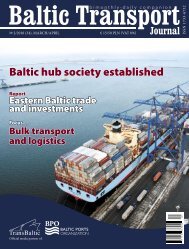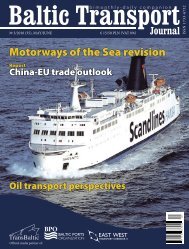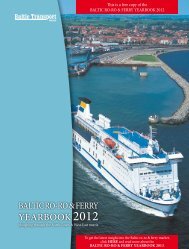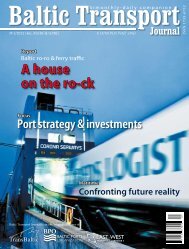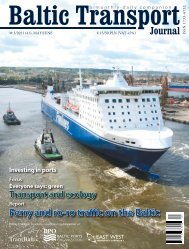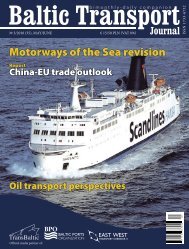Face to face with challenges<strong>Baltic</strong> Ports Conference | 7-9 September <strong>2011</strong>, Rostock Warnemünde, GermanyPorts in order to thrive must not only be well prepared to function in the new market economy, but have to come upwith responses concerning the near future. The competition is getting fiercer; the range of regulations to fulfil isgetting broader, and times are uncertain. BPO gathered again to debate on the key matters for the sector.This year’s <strong>Baltic</strong> Ports Conference held together with theGeneral BPO Assembly were of a unique character, as theyaccompanied the celebration of the 20 th anniversary of the<strong>Baltic</strong> Ports Organization. BPO stakeholders gathered inHanseMesse Rostock, the conference venue, to discuss the economicsituation of the <strong>Baltic</strong> Sea market after the recession. The theme of theevent included the challenges that the market is currently faced with.<strong>Baltic</strong> countries are viewed as much safer than some eurozonecountries, but with the world financial markets getting out of control,<strong>Baltic</strong> states will take a hit if the eurozone breaks apart. Both the USand the eurozone countries are faced with challenging debt problemswithout having a near term solution at hand. The oil market is sufferingfrom recession fears. The crisis is four years old and it is unclearas ever where it will end – these were the conclusions concerning thebackground of the current <strong>Baltic</strong> market situation, comprehensivelydescribed by Dr. Cyrus de la Rubia of HSH Nordbank.Among all conference subjects, the matter which consumed themost attention was the impact of the International Maritime Organization’sdecision to decrease the allowed sulphur content in the marinefuel from 2015, as well as possible solutions to this issue. Basingon the new regulations, only ships powered with a 0.1% sulphur fuelwill be allowed to operate in the <strong>Baltic</strong>, making it less competitive thanthe other seas of Europe. Michael Tasto from the Institute of ShippingEconomics and Logistics (ISL) presented the results of ISL’s researchon the consequences of these regulations for shipping in the <strong>Baltic</strong> andNorth Seas. ISL’s task was to estimate the volumes that would likelybe shifted in container traffic and in truck traffic in 2015, by modellingtransport costs for both land transport and sea transport andsetting up a modal split function, quantifying the loses or gains foreach group resulting from the changes in the shipping fuel prices. AsTasto summed up his presentations, “It is widely accepted that IMOregulations will lead to shifting transportation from sea routes to otherroads – directly in the opposite way as was suggested for over 20 years.The highest shift risk is between Russia and the <strong>Baltic</strong> States – there isfierce competition from the land routes. The current aim is to mitigatethe negative effects of the regulations – i.e. to subsidize pilot projectsas the scrubber technology. It is a pity that such studies weren’t donebefore Member States agreed to IMO regulations.” Among otherPhotos: Port of Rostock/nordlicht40 | <strong>Baltic</strong> Transport Journal | 5/<strong>2011</strong>
possible scenarios is the use of Liquefied Natural Gas (LNG) as a shipfuel which was identified as perhaps the most promising response.Following a lively debate, the conclusion was made that more time isneeded for technology and infrastructure development, before LNGfuel can be used in the BSR on a comprehensive level. The participantssuggested that a re-thinking of these regulations is needed and postponingthem until the sector is ready. Mogens Schrøder Bech from theDanish Maritime Authority presented the LNG infrastructure project(described in <strong>BTJ</strong> 4-<strong>2011</strong>, in the interview with Monica Gullberg of ÅFIndustry, entitled: “Maritime LNG infrastructure within the SECA”),co-funded from the European Union TEN-T programme Motorwaysof the Sea. Generally speaking, its aim is to design and set up guidelinesand recommendations regarding the usage of LNG as fuel, to ensuresafe development of the industry, which is of essence if investmentsare to be made; and ultimately prevent IMO’s SOx regulation’s negativeconsequences for the shipping industry. Ship owners and ports,while recognizing the indisputable value of this new policy – protectionof the environment – agreed that the sector will not be ready forthis tremendous change in four years and expressed the fear of increasedcosts as well as a modal backshift to the road.A bulk part of the conference was devoted to trends and reformsin ports’ governance in Europe, with special focus on the <strong>Baltic</strong> Searegion. Dr. Ulrich Bauermeister, MD of Rostock Port, focused onthe development of German Ports, linking the fast-growing <strong>Baltic</strong>Rim and Central/Southeast Europe, and presented the problemslying ahead of them. The prognosis of cargo turnover in Germanports by the year 2025 are quite optimistic, yet several factors haveto be dealt with, such as the preparation to fulfil the environmentalrequirements, i.e. sulphur and nitrogen emissions legislations aswell as the nutrient intake from passenger ships or to changes in theKimmo Naski describedthe case of Finnishreforms in port management.A change in Finnishmunicipal law in 1992made it possible to commercialiseports and separatetheir budget from themunicipal budget, resultingin increased power in decisionmaking. Further on hepresented a 40-year old issueof cooperation betweenthe Ports of Kotka andHamina, which was finallysettled this year, when Port of Kotka Ltd. and Port of Hamina Ltd. weremerged into the Port of HaminaKotka Ltd. The main reasons for mergingthe ports were the need to increase flexibility; separation of the porteconomy from municipal households as well as ensuring future investmentsand continuity of development through independent financing.This decision empowered the port and enabled it to succeed in internationalcompetition, it also lessened the need for investments, whichis a key factor during economic slowdowns. The merger allowed inaddition smoother coordination and optimization of traffic inside theport, more efficient financing as well as the use of port capacity. Moreover,it brought considerable benefits for shipping lines and forwardingcompanies, as well as for customers, and the majority of owners whorecommended it. The numbers say it all: savings in investments willresult in up to EUR 60 mln within 10 years and the estimated turnovergrowth is to range between EUR 15 -30 mln within 5 years.Photos: Port of Rostock/nordlichtmarket that come with new land transport infrastructure such as theFehmarnbelt and new motorways on the southern <strong>Baltic</strong> coast, whichagain might lead to a modal shift from sea to roads. Bauermeister arguedthat improved competitiveness of transport modes other thanSSS is needed and minimizing overall transport costs is possible dueto the settlement of industries dependent on sea transport in/closeto port areas. Among possible strategies he named High EnergyEfficiency, obtainable e.g. by the concentration of cargo flows, improvedquality of and access to intermodal transport – improved capacityby the Motorways of the Sea project, extension of rail shuttleconnections; a higher share in rail transport in the hinterland as wellas minimizing the environmental impact. Ulrich Bauermeister alsopointed out that concessions for port operators bring worse conditionsfor investments in ports; this issue was further debated later,as a follow up to the speech by Joanna Szychowska, Head of Unit ofDG Internal Market & Services European Commission, “Concessionrules for the ports in EU – new rules to be proposed”.The presentations, touching upon the issues of port laws, efficiencyand competitiveness, were concluded with a panel, duringwhich the future of port authorities was discussed.The Gala Dinner, held in the sky bar of Neptun Hotel inWarnemünde, gave over one hundred delegates the chance tocelebrate the organization’s anniversary as well as honour itsmembers while enjoying the ship lights twinkle on the sea. JulianSkelnik, BPO Chairman since 2007, who was confirmedin office, expressed his satisfaction: “In the past 20 years the<strong>Baltic</strong> Ports Organization could establish itself as a social platformfor representatives from different economic sectors andpoliticians. Today we are equipped to meet the future challengesof the maritime sector. These include not only adaptingto climate and environmental laws, but also the developmentof the hinterland connections of all the <strong>Baltic</strong> ports.” Marta Friedrichowicz, Lena LorencBALTIC PORTS ORGANIZATION • Secretariat Office – Actia Forum Ltd.ul. Pułaskiego 8, 81-368 Gdynia, POLAND, ph.: +48 58 627 24 67, fax: +48 58 627 24 27e-mail: bpo.office@actiaforum.pl, bpo.sg@actiaforum.pl, http://www.bpoports.com5/<strong>2011</strong> | <strong>Baltic</strong> Transport Journal | 41


